Jerry Michalski moderated a panel that was organized at the last minute when Clay Shirky couldn’t make it. He did an excellent job, as did the panelists. They were J.P. Rangaswami, CIO of BT Global Services; Joshua Schachter, founder of Del.icio.us (now Yahoo); and J.B. Holston, CEO of Newsgator. J.B. said an ‘aha’ moment for him was discovering that people interact with automated systems in much the same manner they interact with people, and the rules he found were much the same as editors use to figure out how to interact with their audience. He said a challenge for social apps in the enterprise is how to get people to open up. "How do we cache information from retiring employees, people who didn’t talk much?" The data in their online profiles is hardly enough.
J.P. said he’s learning a lot about online communities at BT. One thing is that people "will often gang up on those trying to game the system." But, he said, "you don’t want to try to stop the kind of collaboration that takes place in the real world" — whatever that may be — the implication being that there are no rules there.
Michalski chimed in that social networks are "really a different way of being in the world," and "what’s doing in the world of the enterprise?" J.P. says he wants his people to focus on the customer benefit, and be candid — "Make a video of what you’re doing and share it," noting that kids today are more comfortable with doing this, being candid and instantaneous. Michalski suggested that the value now is exposing the assets. Joshua Schachter said, yes, "Putting things out there is more valuable than the information itself. People are realizing that." Still, said J.P., there are too many silos. There’s a great deal of social knowledge in corporations, studies show, said Schachter, "but it’s not in computers." The challenge, said Newsgator’s Holston, is to "make it easy, like poking someone in Facebook, or people won’t do it."
Schachter said social apps all have two things in common: individual utility and network utility. "The notion of forwarding," he said, "is very powerful from a social standpoint." He said he gets most of his news from his team’s Del.icio.us tags. It’s not just news stories that he’s interested in. Yes, said Michalski, there’s been so much emphasis on the flow of normal media — "but it’s different now." How do we access the blogs that are most relevant?" asked Holston, rhetorically. He also suggested that we look to the real world for how virality works.
Michalski said he’s now teaching corporations how to help employees let go, be more open. An audience questioner said geeks seem to be more open and comfortable sharing, but how do we get the rest of the organization to do that? Schachter said social activity "is keyed off tribal behavior." He also said we need to build smaller, more effective organizations. J.P. said the covenant between employers and employees has changed. "The social relationship has a lot more power than information." Holston said that corporations get that command-and-control is gone — that doesn’t slow down adoption. He said ROI is needed — "It’s hard to get adoption till you do that."
As the audience questions continued, Schachter made the point that intelligence isn’t just about knowledge. "It’s also about decision making." He also said Wikipedia is good, but he questions how scalable it is. "Knowledge forces a redistribution of power, which is not necessarily bad." J.P. made some closing points: "Social intelligence is not group think. What brings people together is common interest. Things come out of the network that aren’t associated with any one individual." Moderator Michalski got the last word, saying that he thinks "group think is entirely possible with the new tools."
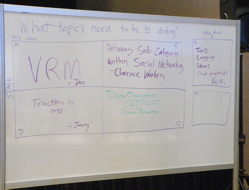
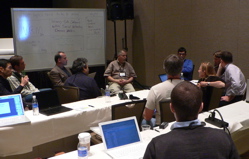
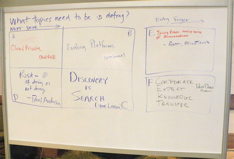
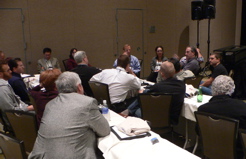
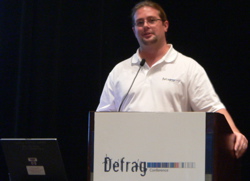
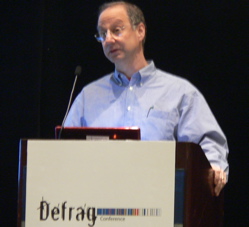


Recent Comments